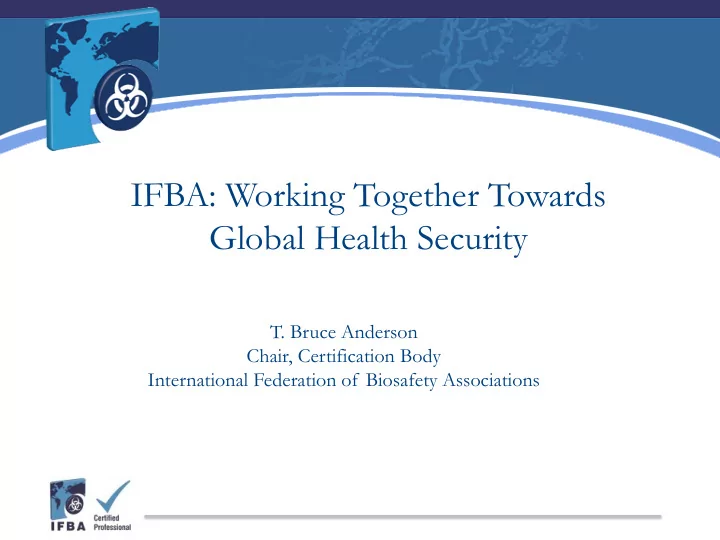

IFBA: Working Together Towards Global Health Security T. Bruce Anderson Chair, Certification Body International Federation of Biosafety Associations
International Federation of Biosafety Associations • IFBA has now grown to 46 Member regional and national biosafety associations • IFBA Observer organizations - government, academia, NGOs, international agencies, professional associations from around the world with an interest in biosafety
Our Global Biosafety Community • How do we empower this network of biosafety organizations and thousands of biosafety professionals? • How can we make a sustainable difference for global health security? Working Together Makes a Difference
Working Together • WHO High-level Stakeholders Meeting on Advancing Global Health Security – Recognized the importance of working together and the role for civil society and biosafety associations
Global Health Security Agenda • IFBA is a member of the Global Health Security Agenda – Action Package Prevent 3 (APP3) on Biosafety and Biosecurity
Global Health Security Agenda APP3WG IFBA’s commitments to GHSA APP3 In collaboration with IFBA’s network of regional and national biosafety associations: • Facilitate partnerships between IFBA’s member biosafety associations and national governments in implementation of APP3 goals and objectives, and obligations under a variety of instruments (BTWC, UN1540, IHR) • Strengthen linkages between public health, animal health and security communities • Provide guidance on developing a national biosafety/biosecurity framework, legislation and guidelines related to the management of biological risks including oversight and enforcement mechanisms to ensure compliance
Global Health Security Agenda APP3WG IFBA’s commitments to the GHSA APP3 • Certify the competency of biosafety officers and individuals handling biological materials in biorisk management, biosecurity, biocontainment facilities, waste management and biological safety cabinets
IFBA’s Certification Program • Independent assessment for competent performance in a variety of technical disciplines related to biosafety & biosecurity • Developed in collaboration with worldwide stakeholders accordance with ISO 17024 • Ongoing assessment (recertification requirements every 5 years)
Exam Content • Exam content is based on the Body of Knowledge for each technical discipline (developed by international subject matter experts from all regions of the world)
Professional Certifications Offered • Professional Certification currently offered in 5 different technical disciplines • Biorisk Management (Certification in Biorisk Management is a pre-requisite to all other certifications)
Professional Certifications Offered • Biosecurity • Biological Waste Management
Professional Certifications Offered • Biosafety Cabinet Selection, Installation & Safe Use • Biocontainment Facility Design, Operations & Maintenance
Exam Delivery • Biorisk Management exams are offered in multiple languages • English, French, Russian, Arabic, Spanish, Turkish
Exam Delivery • Exams are offered online and in paper-based sessions • Only English version of exams are offered online at this time • In conjunction with our IFBA Member Biosafety Association conferences and other events • Separation between training & examination • IFBA does not offer training • Members & Partners offer pre-exam training and IFBA administers exams
Directory of Certified Individuals www.internationalbiosafety.org
Directory of Certified Individuals • Use the designation “IFBA Professional Certification” • Valid for a period of 5 years – specific recertification requirements must be met to maintain certification
Certified Individuals Around the Globe • More than 65 countries around the globe have participated in the program • Issued over 750 certifications
IFBA Global Mentorship Program Fostering regionally and culturally relevant, sustainable biosafety networks • through peer mentoring and global collaboration – 33 mentees paired with 29 mentors – mentors must hold 2 IFBA Professional Certifications – monthly discussion topics (e.g. risk-based approaches to biosafety)
Risk-based Approaches to Biosafety New 4 th edition WHO Laboratory Biosafety Manual • – Shift towards risk-based approaches Eliminates pre-defined risk groups and lab biosafety levels as described in 3 rd – edition – Expected to be released in late 2019
Risk-based Approaches to Biosafety New 4 th edition WHO Laboratory Biosafety Manual • – Describes a minimum set of risk control measures to be implemented (i.e. core requirements), augmented by a set of options for heightened control measures (e.g. HEPA filtration, effluent treatment) that may need to be applied based on the risk assessment – Each facility will implement control measures that are proportionate to their specific risks, and not rely on a predefined universal checklist of measures – Emphasis is placed on procedural and human factors, including good microbiological practices, and trained and competent staff
Risk-Based Approaches • Risk-based practical solutions that can be cost-effectively and locally sustained over the long term
Risk-Based Approaches • Risk-based solutions require biosafety professionals to make sound judgements that best meets the local needs • Shift from acquiring knowledge to applying knowledge in new situations • Requires critical thinking skills, mindset of inquiry, and effective problem-solving
Promote Critical Thinking • Embed critical thinking skills in our approach to teaching biosafety • Challenge biosafety professionals to use and apply ideas • Present subject matter in the context of a problem or issue • Biosafety professionals have the option of offering a judgement or assessment of possible solutions, determining which would be the better choice (wiser, justifiable, sustainable, risk-based, cost-effective)
Recommend
More recommend